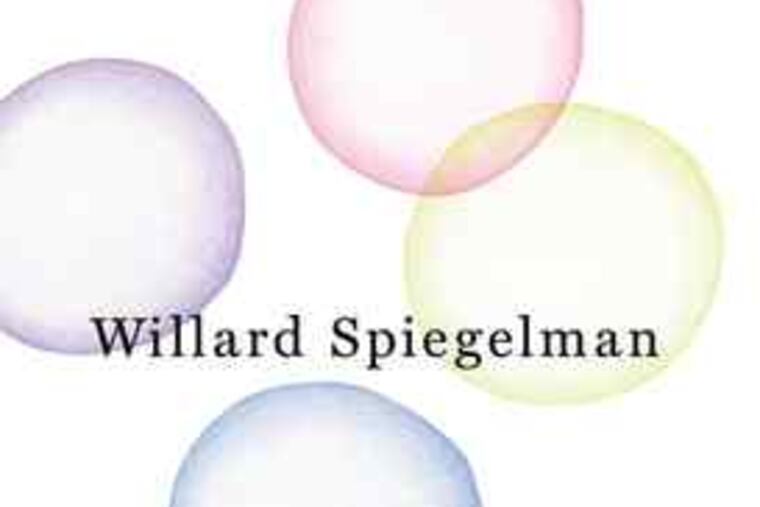Accessible, comforting tips
Essayist explores seven activities in a highly literate how-to for a happier life.

nolead begins Essays on Ordinary Happiness nolead ends nolead begins
By Willard Spiegelman
Farrar, Straus and Giroux.
208 pp. $23
nolead ends nolead begins
Reviewed by Paula Marantz Cohen
In most essays written nowadays, the personal is associated with something odd or idiosyncratic. But in the earlier tradition of the "familiar essay" (a genre begun by Montaigne and extending to Thoreau and Emerson), the personal was a conduit to the universal: The author's experience served as a source of practical and moral guidance.
Willard Spiegelman, Hughes professor of English at Southern Methodist University, hearkens back to this earlier tradition in Seven Pleasures: Essays on Ordinary Happiness. This slim book is surprisingly expansive in its range and potential usefulness. Spiegelman notes that he is a relatively happy person, and the seven pleasures he enumerates, one per chapter, have presumably helped make him so. Taking our cue from him, we can read this book as a highly literate how-to for a happier life.
What are the seven pleasures that have helped Willard Spiegelman achieve ordinary happiness? First, reading. This pleasure came early to the author growing up in the suburbs of Philadelphia in the 1940s and '50s, originally a compensation, perhaps, for being unathletic. He loved books - the bindings and pages as well as the words - and envied friends whose parents, unlike his own, had books on their shelves. He describes the joys of learning to translate from a foreign language (first French, then Latin) and how this laid the groundwork for his future career as a critic. He sketches the reader's landscape of pleasure - the comfort of libraries, the coziness of curling up with a book, the joy of traveling alone and reading in restaurants.
From reading, he moves to explore the pleasures of walking and looking. Despite his respect for Wordsworth's love of nature, Spiegelman prefers to walk in cities (Venice, the most pedestrian-friendly, is at the top of his list, followed by London, Manhattan, and Paris). In cities, "the pleasures of merely circulating," in the words of poet Wallace Stevens, are continual. The looking he most enjoys seems an outgrowth of this love of cities: It centers on pictures in museums. The atmospherics of Turner, the vivid color of Matisse, the strange intimacy of Edward Hopper remind him of the "necessity" of the "inessential" and provide a respite from a professional life immersed in words.
Chapters titled "Dancing" and "Swimming" address physical activities the bookish Spiegelman discovered later in life. Dancing is an "instantaneous joy," a forgetting of the self in the body, but also a site of moral and social intricacies, as he explains in a discussion of dance in Jane Austen's novels.
As for swimming, he describes its physicality as being, like dance, all-encompassing, but with the addition that the other senses are muffled, conducive to a dreamy, meditative state. The first time Spiegelman swam on a regular basis was in his early 20s in the Harvard pool, and he was surprised to find himself doing his laps between the world-renowned psychologist Erik Erikson and the eminent economist John Kenneth Galbraith. Years later, he temporarily lost his pleasure in swimming when he decided to take lessons and his mind became concentrated on the correctness of his stroke. Correct movement eventually became reflexive, and he returned to his earlier zenlike state.
The chapter titled "Listening" deals with music, the pleasure of great music and the pain of bad, which Spiegelman laments now pervades public space. He discusses the marvels that can happen when words are felicitously combined with music in good musical theater and in opera - although in the latter case, he cites the wise gentleman who said, "I don't care what language the opera is in as long as I don't understand it."
His seventh and last pleasure is writing. One writes, he notes, for those often short-lived intervals: "Maybe two minutes a day. Perhaps more. These minutes compensate for the mismanaged hours and the pages left on the cutting-room floor, the drafts discarded, the beginnings obliterated." Understanding the pain and solitude of writing, he tells his students: "You must always write fan letters, especially to poets, because they have no chance of making money, and more important, they have no idea whether anyone in the world is reading and responding to their work."
Spiegelman's book is an attempt to use personal experience to connect both with other writers' experiences and to a larger humanity. As a result, this is a literary book but also an accessible and comforting one to the general reader. All of the pleasures enumerated, with the exception of dancing, are solitary and, as such, can serve as consolation in the face of loss and loneliness.
In the end, this discourse on seven pleasures leads one to want an eighth: conversation. Spiegelman, like Samuel Johnson, whom he cites frequently, seems as if he would be a wonderful dinner companion. Proof of a good familiar essay may be that it makes you want to have a conversation with its author - or perhaps to feel as though you have.